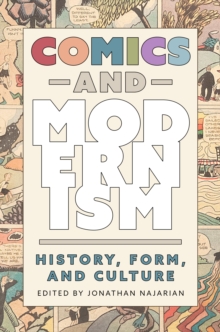
Comics and Modernism : History, Form, and Culture EPUB
Edited by Jonathan Najarian
Part of the Tom Inge Series on Comics Artists series
EPUB
Description
Contributions by David M. Ball, Scott Bukatman, Hillary Chute, Jean Lee Cole, Louise Kane, Matthew Levay, Andrei Molotiu, Jonathan Najarian, Katherine Roeder, Noa Saunders, Clemence Sfadj, Nick Sturm, Glenn Willmott, and Daniel Worden
Since the early 1990s, cartoonist Art Spiegelman has made the case that comics are the natural inheritor of the aesthetic tradition associated with the modernist movement of the early twentieth century. In recent years, scholars have begun to place greater import on the shared historical circumstances of early comics and literary and artistic modernism. Comics and Modernism: History, Form, and Culture is an interdisciplinary consideration of myriad social, cultural, and aesthetic connections.
Filling a gap in current scholarship, an impressively diverse group of scholars approaches the topic from a variety of disciplinary backgrounds and methodologies. Drawing on work in literary studies, art history, film studies, philosophy, and material culture studies, contributors attend to the dynamic relationship between avant-garde art, literature, and comics. Essays by both established and emerging voices examine topics as divergent as early twentieth-century film, museum exhibitions, newspaper journalism, magazine illustration, and transnational literary circulation.
In presenting varied critical approaches, this book highlights important interpretive questions for the field. Contributors sometimes arrive at thoughtful consensus and at other times settle on productive disagreements. Ultimately, this collection aims to extend traditional lines of inquiry in both comics studies and modernist studies and to reveal overlaps between ostensibly disparate artistic practices and movements.
Information
-
Download - Immediately Available
- Format:EPUB
- Pages:336 pages
- Publisher:University Press of Mississippi
- Publication Date:18/01/2024
- Category:
- ISBN:9781496849595
Information
-
Download - Immediately Available
- Format:EPUB
- Pages:336 pages
- Publisher:University Press of Mississippi
- Publication Date:18/01/2024
- Category:
- ISBN:9781496849595










